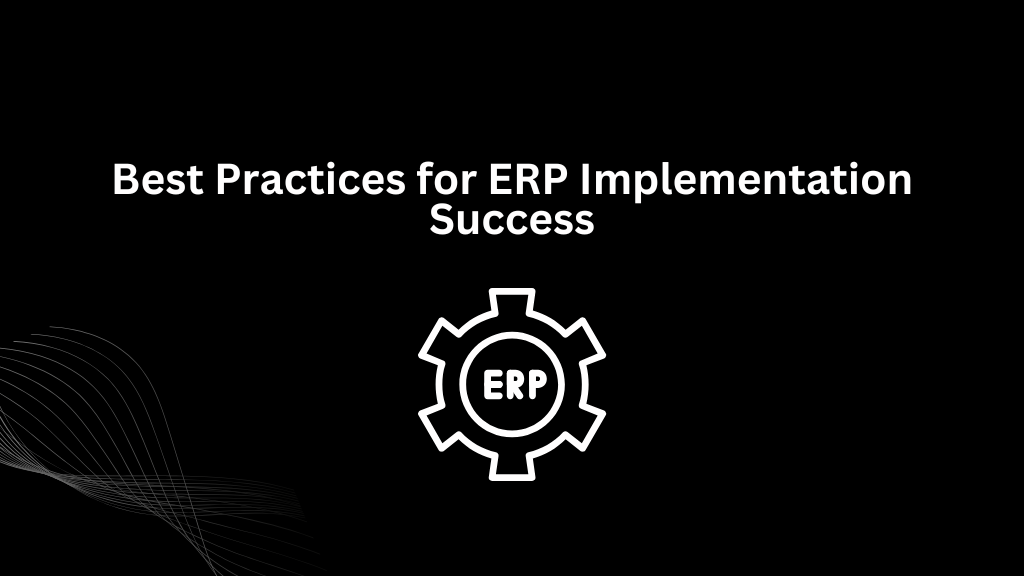Enterprise Resource Planning (ERP) systems are powerful tools that help businesses manage their processes, streamline operations, and make data-driven decisions. However, the success of ERP implementation depends on following a structured approach. This guide explores the best practices to ensure a smooth ERP deployment that brings maximum value to your business.
1. Define Clear Goals and Objectives
Before starting the ERP implementation, it’s essential to define your business goals and objectives. Identify specific outcomes you aim to achieve, such as improved inventory management, better financial reporting, or enhanced customer service. Clearly stated goals provide a roadmap for the project and help evaluate its success later.
2. Choose the Right ERP System for Your Needs
Not all ERP systems are the same, and selecting one that aligns with your company’s needs is critical. Consider factors like your industry requirements, scalability, integration capabilities, and user-friendliness. Research options like SAP B1, Oracle NetSuite, and Microsoft Dynamics to find a solution that fits your business operations.
3. Build a Strong Project Team
A successful ERP implementation relies on a dedicated project team. This team should include representatives from key departments such as finance, IT, and operations. Having skilled team members who understand the company’s goals and processes ensures the ERP system is tailored to the unique needs of your business.
4. Plan for Data Migration
Migrating data from legacy systems into the new ERP is a critical step. Ensure data accuracy, consistency, and completeness before the transfer. A thorough data cleanup and validation process reduces errors and improves the performance of your new ERP system. Make sure to back up essential data in case issues arise during the transition.
5. Focus on Training and Change Management
A well-designed ERP system can only be effective if employees know how to use it. Comprehensive training and change management are essential to encourage user adoption. Consider holding workshops, offering online training sessions, and providing clear user guides. Addressing employee concerns early helps ease the transition and builds confidence in the new system.
6. Test the System Before Going Live
Testing is one of the most important steps in the ERP implementation process. Conduct thorough testing to identify any issues, errors, or performance issues. Start with unit tests, followed by system-wide tests to ensure everything works as expected. By thoroughly testing, you can address potential problems before the full rollout, minimizing disruptions.
7. Monitor and Optimize Post-Implementation
After going live with the ERP, monitor its performance closely. Gather feedback from users to identify any adjustments needed. Regularly review and optimize processes to make sure the ERP system continues to meet the company’s evolving needs. Scheduling regular audits can help you pinpoint areas for improvement and maintain peak efficiency.
Benefits of Following These Best Practices
By following these best practices, you can achieve a successful ERP implementation that delivers long-term benefits, including:
- Improved Efficiency: Streamlined workflows and automated processes save time and reduce manual errors.
- Enhanced Decision-Making: Real-time data provides better insights, helping management make informed decisions.
- Scalability: An effective ERP system grows with your business, supporting future needs without requiring a complete overhaul.
About 3techno
3techno specializes in ERP solutions, offering expert guidance on selecting, implementing, and managing ERP systems like SAP B1, Oracle NetSuite, and Microsoft Dynamics. With a deep understanding of business process optimization, 3techno helps companies drive efficiency and improve decision-making through seamless ERP integration. If you’re considering an ERP system, 3techno’s experienced team can ensure a smooth implementation tailored to your unique needs.
By following these best practices and partnering with experienced providers like 3techno, your business can achieve ERP implementation success and unlock the full potential of enterprise technology.

